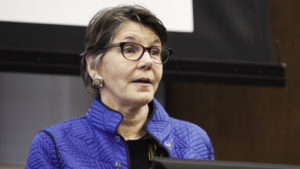
President Donald Trump says he will attempt to end birthright citizenship, Federal Reserve proposes banking regulation rollback, and more…
IN THE NEWS
- President Donald Trump plans to issue an executive order that would attempt to remove birthright citizenship. “It is not covered by the Fourteenth Amendment” and “will be settled by the United States Supreme Court,” he tweeted. Multiple legal scholars reportedly expressed skepticism that birthright citizenship can be overturned by executive order.
- The Board of Governors of the Federal Reserve System proposed a new banking framework that would relax liquidity safeguards—which require banks to keep a certain amount of cash or equivalent assets available—at banks with up to $700 billion in assets. Federal Reserve’s Vice Chairman for Supervision Randal K. Quarles stated the proposal would result in “reduced regulatory complexity…with no material decline in the strength of the U.S. banking system.” Bartlett Naylor, financial policy advocate at Public Citizen, opposed the rollback as “misguided deregulation” that particularly threatened “America’s heartland” where most large regional banks operate.
- A federal jury in Colorado found that a marijuana grow operation did not hurt the property value of its neighbors. Plaintiffs filed the lawsuit under the Racketeer Influenced and Corrupt Organizations Act (RICO), claiming that the marijuana operation was “violating the federal drug laws.” If the lawsuit had been successful, RICO would have required the grow operation to pay triple damages to the plaintiffs and could have threatened the entire cannabis industry.
- FDA requested comments concerning sesame allergies. FDA currently requires foods containing milk, eggs, fish, shellfish, tree nuts, peanuts, wheat, and soybeans to bear a label declaring the allergen and is considering adding sesame to that list. FDA Commissioner Scott Gottlieb stated that sesame allergies are “a growing concern” in the United States and appear at rates comparable to soybean and fish allergies.
- The U.S. Environmental Protection Agency (EPA) withdrew a 2017 proposed rule that would have regulated uranium in-situ recovery (ISR)—a mining method that extracts uranium from groundwater. EPA cited lower-than-expected applications for new ISR licenses, comprehensive current regulations, and doubt as to EPA’s legal authority as its reasons for withdrawing the rule.
- Companies from across the American automobile industry opposed a proposed rule from EPA that would freeze greenhouse gas emissions and fuel efficiency standards in 2020. Automobile companies such as Fiat Chrysler and General Motors (GM) and oil companies such as Shell had initially approved of the Trump Administration’s decision to roll back standards that “make new vehicles more expensive” and “reduce demand and jobs,” according to GM. The proposed solution of freezing standards, GM wrote, “is not the answer to these regulatory challenges”; instead, GM suggested standards that “continue improving” fuel economy.
- The U.S. Department of Justice is reportedly investigating U.S. Secretary of the Interior Ryan Zinke for possibly using his office for personal gain, after a referral from the Interior Department’s Office of the Inspector General. The office had been investigating Zinke’s involvement in multiple agreements, including a real estate development deal with the oil company Halliburton, which could increase the value of properties owned by Zinke.
- The European Commission announced it will investigate a proposed joint venture between two “major” steel companies for its effects on competition in the European steel market. The companies, Tata Steel and ThyssenKrupp, supply steel for cars, packaging, and engineering products. The Commission expressed preliminary concerns that steel customers “would face a reduced choice in suppliers, as well as higher prices” if it were to allow the joint venture to go through.
- Hong Kong’s Securities and Futures Commission (SFC) reiterated that companies that manage more than 10 percent of their portfolios in virtual assets such as digital tokens are subject to SFC oversight. This requirement would apply even if the virtual assets under management do not meet the definition of a security or futures contract under the Securities and Futures Ordinance (SFO), according to the SFC. “Only professional investors as defined under the SFO should be allowed to invest in any virtual asset portfolios,” the SFC said.
- The U.S. Food and Drug Administration (FDA) announced a new plan to “support innovation” and “ensure the safety of plant and animal biotechnology products.” The plan addresses biotechnologies that can produce foods or pharmaceuticals from genetically altered plants and animals. FDA also announced a public webinar on December 3 discussing the uses and risks of genome editing in animals.
WHAT WE’RE READING THIS WEEK
- President Trump’s proposal to end birthright citizenship would be illegal under the Fourteenth Amendment of the U.S. Constitution, wrote George T. Conway III of the law firm Wachtell, Lipton, Rosen, and Katz and former acting U.S. Solicitor General Neal Katyal in a column for The Washington Post. “Sometimes the Constitution’s text is plain as day and bars what politicians seek to do,” they wrote. President Trump argued that the Fourteenth Amendment does not apply.
- In an article for the University of Hawai’i Law Review, Samuel D. Adkisson, a recent graduate of Yale Law School, offered a way for the National Highway Traffic Safety Administration (NHTSA) to regulate driverless vehicles. Adkisson proposed that NHTSA should adopt a system-level standard—a standard “that requires an overall level for safety of an entire driving system.” He suggested that the standard could be based on the rate of crashes “relative to a certain number of miles driven,” and he said that this rate should not exceed the rate of crashes by human-driven cars under equivalent conditions.
- In a recent article for Sustainable Development Law & Policy, LaTravia Smith, a student at the Vermont Law School, advocated for clear standards defining “humane” treatment of chickens raised for food. Smith argued that current poultry labeling can mislead consumers because chicken producers are not required to meet any specific animal welfare standards to make claims of humane practices. Smith highlighted the fact that some consumers are willing to pay premium prices for humanely raised chicken—but, without clear regulatory standards, those consumers will not know which producers are making genuine efforts to raise animals humanely.



